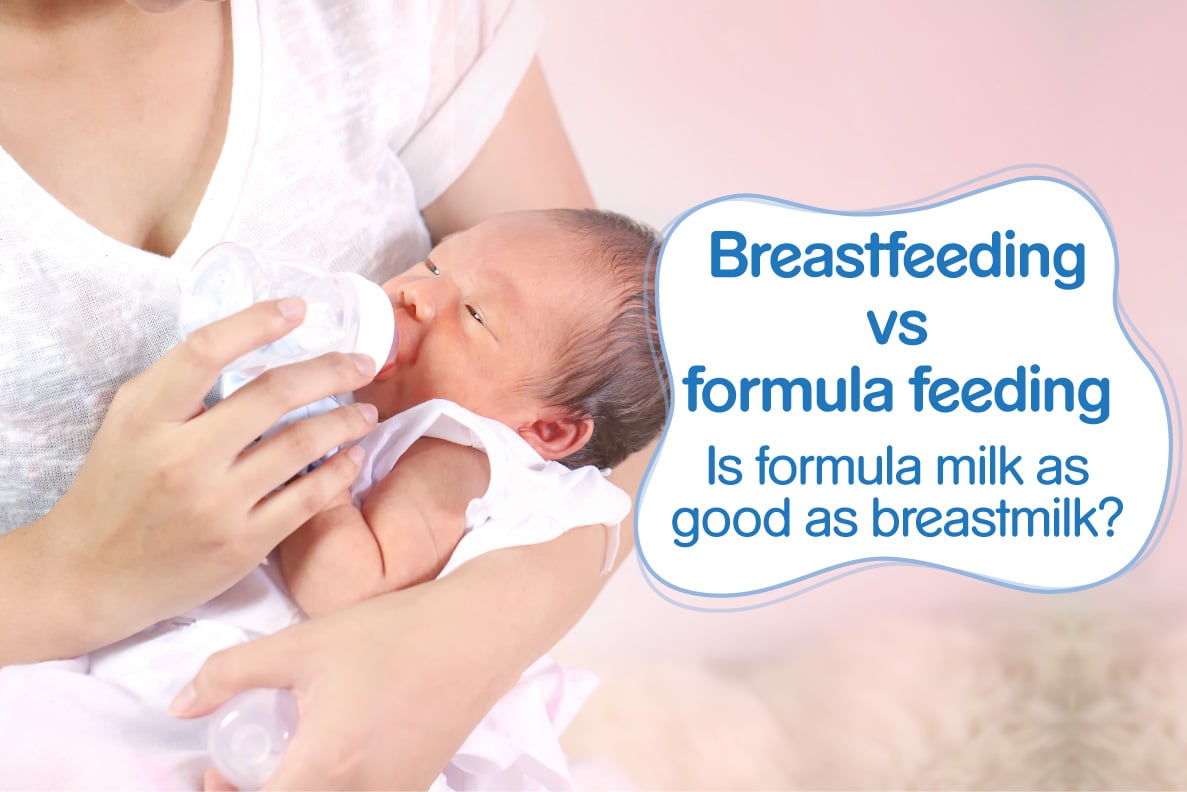Breastfeeding vs Formula Feeding – Is formula milk as good as breast milk?

New moms must make a big decision between breastfeeding or formula feeding for their little one. Many health specialists prefer breastfeeding over formula feeding as your baby will get the maximum nutrients. However, women with prevailing illness such as heart disease, or a rare condition known as Hypoplasia that results in not being able to produce milk in their breasts. Therefore, not many women have the option to breastfeed. In that case, formula feeding is your next safe option.
It’s your personal choice whether to breastfeed or formula feed your baby. After you critically weigh the advantages and disadvantages of each, you can make the best choice for your baby.
Understanding breastfeeding:
Breastfeeding helps to protect your little one against certain illness and diseases. Breast milk should be given to babies for six months as it contains essential proteins, minerals, and growth hormone intended brain development of your little one.
What does “Breast Milk” contain?
- Breast milk consists of 87% water, 1% protein, 4% lipid, and 7% carbohydrate (including 1 to 2.4% oligosaccharides)
- Vitamins and minerals that a newborn requires. (Calcium, Phosphorus, Magnesium, Potassium, and Sodium)
- Millions of live cells
- More than 1,000 proteins
- Hormones such as Prolactin, TSH, T3, T4, Leptin, and Relaxin that helps in growth, and development of the baby.
- Antibodies
- Benefits of breastfeeding your little ones
1. Protects babies from illness and diseases:
Breast milk protects babies from illness and diseases as it contains antibodies, and other germ-fighting substances that improves the immune system of your babies. This reduces a baby’s risk of contracting a variety of infections, including:
- Infections in the ear, and lungs
- Diarrhea
- Meningitis
- Allergies
2. Easy to digest:
A newborn can easily digest the components of breast milk, which include lactose, protein (whey and casein), and fat. Breastfed newborns, on average, have less trouble digesting than formula-fed infants. Breast milk is easier to digest, therefore breastfed newborns have fewer spells of diarrhea or constipation. Many of the vitamins and minerals that a newborn requires are naturally found in breast milk.
3. Strengthens emotional bond:
The skin-to-skin contact when breastfeeding enables you to create a strong emotional bond with your baby.
4. Feed anywhere:
You can feed your newborn while on the go without having to mix formula or prepare bottles. Breastfeeding can also bring comfort to babies whose typical routine has been disrupted while travelling.
5. Provides protection to mothers as well:
Mothers who breastfeed are less prone to get breast cancer, type 2 diabetes and high blood pressure.
About formula feeding:
The next safe alternative to breastfeeding is formula milk. Formula milk, often known as baby formula or infant formula, is typically prepared from processed cow’s milk. Formula milk gives the nutrition that newborns require to grow and develop. However, it does not provide the same health benefits to you and your baby as breast milk.
What does “Formula milk” contain?
- Formulas are made of 6 basic components – protein, fat, carbohydrate, vitamins, minerals, and other nutrients.
- Most infant formula is made with cow’s milk
- It contains lactose and plant-based oils, such as palm, rapeseed, coconut, sunflower and soybean oil
- Vitamins and minerals from plant and animal sources
- A couple of enzymes and amino acids, fat, and probiotics
Benefits of formula feeding your little ones:
1. Independent:
Once the bottles are prepared, a formula-feeding mothers can leave her baby with a partner or caregiver and be certain that her child’s feedings will be met. There’s no need to pump or plan other commitments and activities around the baby’s feeding schedule.
2. Diet:
You do not have to monitor your diet and avoid foods that will make your baby fall sick. Usually, breastfeeding mothers are asked to avoid certain food like dairy products, caffeine, spices, grains, beans, nuts, gassy foods (vegetables like cauliflower, cabbage, garden cress, bok choy, broccoli, brussels sprouts and similar green leafy vegetables.)
3. Time for your spouse to bond:
Babies do not know the difference between the day or night, especially during the first few weeks’ newborn babies wake up in the middle of the night because they are hungry. Your spouse or anyone for that matter can feed formula-fed babies. This way they will also be able to build an emotional connect with the babies.
Ultimately, it’s your personal choice whether you want to breastfeed or give formula milk but make sure you are feeding your baby properly. When you are breastfeeding, make sure that the baby’s mouth is properly attached to the breast. Likewise, if you are formula feeding, ensure that the nipple of the bottle is of the right size. A bigger nipple size will result in the baby consuming excess air causing colic.
Colic is caused by wrong feeding habits and your little ones may experience pain, discomfort or cry excessively. You can treat colic naturally by using Woodward’s Gripe Water. It’s an ayurvedic formulation and non-alcoholic solution that is completely safe for your little ones.
